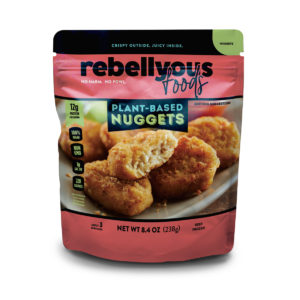
The plant-based food market is exploding. Global sales of plant-based meat and dairy products hit $29.4 billion last year, and Bloomberg projects that will more than quintuple to $162 billion by 2030.
One of the challenges of plant-based meat is their cost compared to traditional proteins — one pound of ground Beyond Meat is currently $7.99 at Safeway, while a pound of ground beef is $4.49. The pandemic has decreased the imbalance somewhat as meat prices have surged. But the real goal, according to Christie Lagally, founder and CEO of Rebellyous Foods, is to bring down the price of plant-based products so that they are affordable for everyone.
 Lagally will be the featured speaker at the Biennial Women’s Alliance Network Breakfast next month at PROCESS EXPO. She will also be participating in a panel discussion entitled “Tomorrow’s Foods Today: Plant-Based Proteins and Beyond” as part of PE University. On a recent Zoom call, I spoke with Lagally about Rebellyous Foods and how they’re tackling the challenges of plant-based food production.
Lagally will be the featured speaker at the Biennial Women’s Alliance Network Breakfast next month at PROCESS EXPO. She will also be participating in a panel discussion entitled “Tomorrow’s Foods Today: Plant-Based Proteins and Beyond” as part of PE University. On a recent Zoom call, I spoke with Lagally about Rebellyous Foods and how they’re tackling the challenges of plant-based food production.
What’s the origin story of Rebellyous Foods?
CL: The company started in 2018 through Y Combinator, a Silicon Valley startup investor and accelerator. We launched with a product and the intention to design new equipment around making plant-based meat faster, better, and cheaper. We’ve since grown into a CPG company that serves both the retail and foodservice markets. We have seven different SKUs, as well as a product for the National School Lunch Program called Kickin’ Nuggets.
 We run our own manufacturing facility, and we also run a research and development lab that designs, deploys, and builds new production equipment. I have a bachelor’s and a master’s in mechanical engineering, and I used to work in the aerospace industry, which is where I started to hone my skills around how we can use manufacturing to provide products to consumers much more effectively, much more efficiently, and much more cost-effectively.
We run our own manufacturing facility, and we also run a research and development lab that designs, deploys, and builds new production equipment. I have a bachelor’s and a master’s in mechanical engineering, and I used to work in the aerospace industry, which is where I started to hone my skills around how we can use manufacturing to provide products to consumers much more effectively, much more efficiently, and much more cost-effectively.
What piqued your interest in the food industry?
A passion for the cause around why people eat plant-based meat. A lot of people don’t realize that we, as humans, have been replacing meat on our plates for a long time.
We have documented evidence from almost 1500 years ago showing that people have attempted to reduce their meat consumption, whether for health reasons or ethical reasons.
In the modern day, we have a lot of reasons to want to reduce our meat consumption, in part because we eat a lot more meat than ever before. And also because we’re starting to understand the impact on climate change of the large amount of meat that we consume and produce — especially in the United States, but globally as well.
A lot of people want to eat plant-based meat, but there isn’t enough so they eat whatever’s available, whether it’s at the ballpark or the stadium or in the school cafeteria. If we can offer plant-based versions of products like chicken nuggets, patties, tenders, chicken pieces…then there’s a real opportunity for us to make a societal impact without asking people to necessarily change their behavior right away.
What are some of the manufacturing challenges with plant-based meat?
Plant-based meat has a really interesting history in the United States. We’ve actually been making commercial plant-based meat as an industry since about 1899 — there was a peanut-based canned meat called Protose. Later, we started making products out of soy. So, we went from mixing plant-based products to using peanuts, to spun soy, and then to mixing extruded products with flavoring.
Today, 80-90% of the plant-based meat industry, at least in the United States, is made using mix-and-form production, while the rest is high-moisture extruded products. But even though plant-based meat has been around for a long time, not much equipment has been developed specifically for that process.
And that’s what we do at Rebellyous Foods. We design and build and prototype and get partners to help us build final versions of, and then ultimately deploy, equipment, for the mix-and-form production of plant-based meat. The products range from low-moisture texturized proteins for things like fish patties and breaded products to whole muscle meat replacement products, but they are all ultimately formed via the mix-and-form production process.
We have a system that we call the Mock-1 production system. It processes about 100-200 pounds per hour, which is for our pilot facility. We’re working on scaling up a new system, the Mock-2, to run 2,000 or 3,000 pounds per hour, potentially more. These tools can reduce the labor costs of a production line for making bread-battered fried plant-based chicken products by as much as 50% and the overhead cost by 60%. This gets us at, or near, the price of processed chicken products, making it cost-effective for people to choose plant-based products.
What is unique about processing plant-based meat?
Currently, most mix-and-form production of plant-based meat is done in meat processing facilities using equipment like bowl choppers, tumblers, and conveyors — equipment that’s intended to deconstruct the animal carcass and bring it down into smaller pieces. This is literally the opposite of what we want in the plant-based meat industry.
We are trying to do constructive manufacturing. It’s the same process that bakers use when they make bread. They bring all sorts of things together that need to be cohesive — the flavors have to work together, the oil has to be distributed just right.
The Mock-1 is an additive manufacturing system that properly brings together all of the ingredients necessary for making plant-based meat. As a result, when done correctly you end up with a higher quality product. The system can make three times the volume of the traditional processing equipment that’s sitting in the same space in a facility. And you have shorter sanitation cycles — you don’t have to spend as much time cleaning a large machine when you can just send the product through a continuous production system. There are many more advantages to our system that all are designed around the first principles of making plant-based meat in an additive manufacturing scenario.
Will your equipment be on the market as well?
Yes, absolutely. We definitely ended up starting two companies by accident! But in order to solve the problem, we had to solve it for ourselves, and now we have the opportunity to sell the Mock-2 to other facilities. The system could easily be used for any mix-and-form production product like MorningStar Burger, Impossible Burger, or Beyond Burgers.
We can also make it possible for chicken processing facilities that are currently making animal-based chicken products to replace some of their equipment with the Mock-2 production system and convert it into a plant-based line. And that’s really our vision — we know there are many opportunities to not just evolve the consumer to plant-based, but to evolve the processing industry.
What other innovations are needed in processing equipment for plant-based foods?
I feel like our list of things that we could continue to innovate on is just as long as it is wide. There’s a variety of recipes that we can adapt to. For example, our Mock-1 production system currently does emulsification for a low saturated fat source, but there are some companies using a high saturated fat source. This is an important opportunity that we haven’t even investigated yet.
We’re also working on better frying capabilities because plant-based meat fries differently. Proper freezing of plant-based meat can also be perplexing. Water loss is a huge problem. Production is easier to do on a small scale, but the scale-up procedures require new applications of fundamental physics to get right and to make sure that quality is maintained at all different levels. We’re working on these and many other challenges.
I would love to talk to other manufacturers that have solutions. Collaboration is a big part of what we do. We’re excited that there are so many parts in the system that need innovation and need new solutions, and we’re excited to work with other suppliers so we don’t necessarily need to invent everything from ground zero.





![[Webinar] From Selection to Success: Navigating the Food & Beverage ERP Journey](https://foodindustryexecutive.com/wp-content/uploads/2025/03/ECI_From-Selection-to-Success-Navigating-the-Food-Beverage-ERP-Journey-218x150.png)

![[Report] 2025 State of Food Manufacturing: Digital Transformation](https://foodindustryexecutive.com/wp-content/uploads/2025/04/2025-State-of-Food-Manufacturing_-Digital-Transformation-218x150.png)

